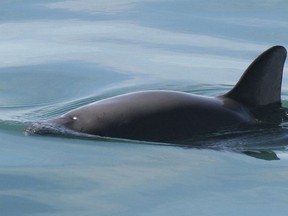Environmentalists said Tuesday that plans to sink 193 concrete blocks were approved without public comments.
Article Author:
Associated Press
Mark Stephenson

Mexico City — The Mexican Navy is on the verge of extinction on Tuesday A controversial plan to drop a concrete block to the bottom of the Gulf of California to catch an illegal net that drowns an endangered vaquita.
Of the small, elusive porpoises, only eight remain in the Gulf, also known as the Gulf of California. They live only here and cannot be captured and bred in captivity.
Bakitas is trapped in a gill net and drowns. Totoaba is a rare floating bag in China, a fish that sells for thousands of dollars (kilograms) per pound.
The Mexican government has significantly abandoned efforts to keep small fishing vessels away from the 110-square-mile (288-square-kilometer) "zero-tolerance" area near San Felipe in Baja California. It was seen.
Environmentalists said Tuesday that plans to sink 193 concrete blocks were approved without public comment, and metal hooks attached to the blocks accumulated net debris and involved marine life. , Expressed concern that it could continue to drown.
"This is a complete surprise as the statement on environmental impact was approved in record time of 6 weeks. Public comments were not published." Said Alex Oliveira, Mexico's representative of the Biodiversity Center.
The Mexican Environment Agency admitted that there were no public comments, saying it was because no one requested comments. This department has become known for its rapid approval of government projects.
There are many questions about the plan. It scatters one block every 1km across the zero tolerance area, with the metal hook being attacked. It is not clear how or if the trapped net will be recovered from the water.
"The net can get caught on these hooks, but I don't know. I'm talking about a net that is hundreds of yards (meters) long, so I don't know if it got caught. There is a double-edged sword that may catch Bakitas, "Olivera said.
Abandoned nets, known as "ghostnets," can continue to kill marine life for years.
Another expert, who was afraid of retaliation and did not want to be quoted by name, said the plan could discourage illegal fishermen by stealing nets.
But he added that it is important for the Navy to regularly clear the trapped nets. "Or other species could be killed there."
In a statement announcing the plan, the Navy vaguely mentioned "recovery of detained nets." In reality, the diver descends and has to manually disconnect from each of the 193 blocks every few days.
Given the rebellion of fishermen and the lucrative nature of the illegal trade in dry Totoaba bladder, fishermen may not physically or use GPS to mark the location of surrounding blocks or fish. There is no guarantee. they.
Last year, the Mexican government abandoned its policy of keeping fishing boats away from the "zero tolerance" zone in the upper bay. Then, if more than 60 fishing vessels were seen many times in the area, it introduced a sliding scale of punishment.
Oliverra expressed doubt. "They can't check these blocks daily," he said.
Earlier this year, the United States filed its first trade-based environmental complaint under the US-Mexico-Canada Trade Agreement, claiming that Mexico did not protect its species.
Mexico has agreed to the investigation. Under the treaty that came into force in 2020, complaints could lead to trade sanctions.

From the newsroom to the noon inbox, Toronto Sun's latest headlines, stories, opinions and photos. By clicking the
Thank you for registering.
A welcome email has been sent. If you don't see it, check your junk folder.
Your Midday Sun's next issue will arrive in your inbox shortly.


